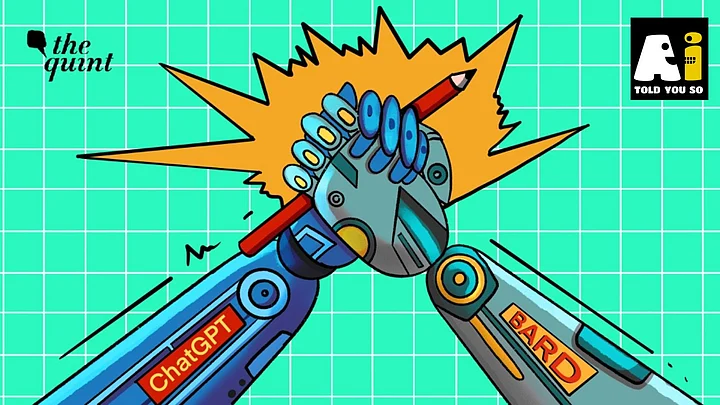(This article is a part of 'AI Told You So', a special series by The Quint that takes a closer look at the possibilities unlocked by Artificial Intelligence in various sectors and walks of life, where the technology stands today, and the challenges ahead.)
The singing bards of medieval Scotland or ancient Greece were often seen as keepers of history and tradition. But Google might be looking to give them new purpose.
Driving the news: The tech giant is working on a new conversational Artificial Intelligence (AI) tool called 'Bard', according to a blog post by CEO Sundar Pichai on Tuesday, 7 February.
At present, only "trusted testers" have been allowed to take a crack at Bard.
However, the AI chatbot could be made "more widely available to the public in the coming weeks," Pichai wrote.
"It’s a really exciting time to be working on these technologies as we translate deep research and breakthroughs into products that truly help people. That’s the journey we’ve been on with large language models (LLM)," Pichai added in his post.
Why it matters: The field of generative AI has been evolving at a rapid pace, such that the larger public is starting to take notice of the real-life applications of such AI models. This, in turn, has renewed interest among big tech companies and investors who are looking to get in the game.
Elephant in the chat room: It is no coincidence that Google is making big moves in the AI space just a month after Microsoft decided to go all in on ChatGPT – another revolutionary LLM chatbot that has been developed by Open AI.
In fact, things are moving so fast that Microsoft CEO Satya Nadella announced on Wednesday, 8 February, that the new version of its search engine Bing will be driven by the same tech that powers ChatGPT.
Its browser, Edge, is also expected to get an AI upgrade.
What Is ChatGPT? Catch Up Quick
ChatGPT has become the subject of much fanfare as it is capable of explaining a complex scientific phenomenon, generating lines of code, composing poems, among other tasks.
In fact, with the right prompt or question, there's little that ChatGPT can't come up with from scratch.
As a testament to its success and sophistication, Open AI has already rolled out a paid version of its chatbot called 'ChatGPT Professional'.
Expand
What Are Google's Plans for Bard?
With Bard, Google is looking to walk the tightrope between creativity and curiosity. The AI chatbot will be able to provide high-quality responses based on information that's available online, the tech giant revealed.
Further outlining its capabilities, Google said that Bard will be able to help "explain new discoveries from NASA’s James Webb Space Telescope to a 9-year-old, or learn more about the best strikers in football right now, and then get drills to build your skills."
Of course, Bard's primary use case will be integrating it with Google Search. But what will that look like?
While Google hasn't spelled out the role that Bard will play in enhancing its search engine, it has said that "AI will be helpful in those moments" where users are not just looking for factual answers but "deeper insights and understanding."
"Soon, you’ll see AI-powered features in Search that distill complex information and multiple perspectives into easy-to-digest formats, so you can quickly understand the big picture and learn more from the web: whether that’s seeking out additional perspectives, like blogs from people who play both piano and guitar, or going deeper on a related topic, like steps to get started as a beginner," the CEO's blog post read.
However, Google is yet to reveal when exactly these new AI features will be rolled out for Search.
What's Under the Hood of Bard?
Coming back to Google's Bard, the model is reportedly built on top of the tech company's own language model called LaMDA, that was announced back in 2021 with the intention of making conversations between humans and chatbots smoother.
"We’re releasing it [Bard] initially with our lightweight model version of LaMDA. This much smaller model requires significantly less computing power, enabling us to scale to more users, allowing for more feedback," Pichai explained.
Interestingly, LaMDA is the same chatbot that was said to have "come to life," at least according to software engineer Blake Lemoine who had apparently spent some time shooting the breeze with the AI model.
Lemoine's claim was quick to make headlines but it eventually cost him his job at Google.
How Does Bard Stack Up Against ChatGPT?
While it may be a bit early to start pitting Bard against ChatGPT, there are a few similarities that are pretty evident right off the bat.
For instance, both Google and Open AI have adopted a measured approach with their respective models. ChatGPT was reportedly trained using a cleaner dataset in order to avoid mistakes of the past – as seen in the case of GPT 3 and Codex, which were older Open AI models said to generate highly unfiltered responses.
Meanwhile, Google has said that it will "combine external feedback with our own internal testing to make sure Bard’s responses meet a high bar for quality, safety and groundedness in real-world information."
Another similarity is that the immediate applications of these LLM models will be to enhance search engine results. Chinese search giant Baidu also recently announced plans to launch its chatbot "Ernie" in March this year. Something else that's common between Bard and ChatGPT is that their knowledge appears to be limited to 2021 data.
Taking into account their resemblances, is it more likely that the two AI models could end up chit-chatting with each other? Food for thought.
(At The Quint, we question everything. Play an active role in shaping our journalism by becoming a member today.)
